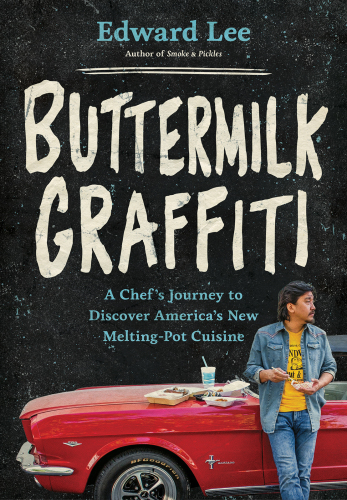
Buttermilk Graffiti
A Chef's Journey to Discover America's New Melting-Pot Cuisine
کتاب های مرتبط
- اطلاعات
- نقد و بررسی
- دیدگاه کاربران
نقد و بررسی

March 15, 2018
What we think of as "traditional" American cuisine has been formed by waves of immigrants who built this country. Now we are witnessing a transformation of American food as new waves of immigrants arrive from other countries. In this travelog and food memoir, chef Lee travels the country revisiting traditional American dishes and exploring the new cultures that are changing the culinary landscape. At each stop, the author makes a point of getting to know some of the locals and the history of the place and food as well as listening to the people's stories and how to make their traditional dishes. In Connecticut, Lee explores Moroccan food, as well as seeking out an old favorite: the white clam pizza. The typical Southern fare of Mississippi and Alabama are quite different from the foods of the growing Lebanese and Korean populations. From Seattle to New Jersey and everywhere in between, Lee explores the rich cultures that shaped American food and the growing cultures that will continue to form its evolution. VERDICT Lee's curiosity and talent for storytelling result in a fascinating, vibrant look at our country's diverse, ever-changing cuisine.--Melissa Stoeger, Deerfield P.L., IL
Copyright 2018 Library Journal, LLC Used with permission.

Starred review from January 29, 2018
This excellent collection of culinary travel essays by chef and TV personality Lee (Smoke & Pickles; The Mind of a Chef) takes readers across the U.S. in search of immigrant cuisine. A Korean-American kid from Brooklyn who now runs restaurants in Kentucky, Lee is an eager mixer of styles and traditions. He writes, “Show me your recipes, and I can tell who you are.” It’s a sweet and heady mélange of travelogue, in which Lee plays the eager investigator chasing down cooks to figure out how or why they cooked a dish he ate; he ends each chapter with recipes inspired by the food he’s just eaten, but capped with his own twists. Lee mixes rapturous and unfussy descriptions of the dishes he discovers—from the shockingly good Cambodian food in Lowell, Mass. (smoked ground fish in mud fish sauce, and cow intestines in a fermented fish paste), to the influence of Lebanese food in Clarksdale, Miss. (made with beef at one restaurant, the kibbeh is served raw or fried), and Clarksburg, W.Va., where immigrant Italian coal miners packed pepperoni rolls for lunch. Lee celebrates unexpected confluences of cuisines while refusing to be limited by definitions of “authenticity.”

February 15, 2018
An acclaimed chef and restaurateur travels across the country to explore the cultural history behind the evolving American cuisine.Lee (Smoke & Pickles, 2013) takes readers on an edifying two-year ride in which he digs for the personal ties that bind cooks, restaurant owners, and loyal patrons to the food in their region. His journeys included an accidental four-day Ramadan fasting in Dearborn, Michigan, where he had no set plan but to devour Middle Eastern cuisine; a sojourn to the Texas coast to hear about the experiences of Vietnamese fisherman while feasting on Gulf delicacies; and a trip back in time to the Big Apple Diner in New York, where the author worked in the early 1990s. Along the way, Lee learned traditional cooking techniques like making smen, a Moroccan fermented butter, and he points out the essential role that both immigrants and longtime settlers play in the food we eat. "Our food traditions are the last things we hold onto," he writes. "They are not just recipes; they are a connection to the nameless ancestors who gave us our DNA. That's why our traditional foods are so important." With plenty of lyrical appreciations of an impressively wide variety of cuisines, the author leaves readers craving the food he describes while also ready to attempt the advanced recipes at the end of each chapter--e.g. Amok trey, bourbon-washed butter, and pollo a la brasa. Lee effectively transports readers next to him during his encounters and inside of his thoughts during moments of introspection. A few hard transitions and seemingly unrelated stories may cause some confusion, but the author ultimately leads readers to a better understanding of the dishes he experienced and the recipes he provides.A heartfelt and forward-thinking book in which Lee's experiences and travel accounts successfully create an eager appetite for adventurous recipes, the stories behind the relationships of the people that inspire them, and a strong appreciation for the cooking traditions they've upheld.
COPYRIGHT(2018) Kirkus Reviews, ALL RIGHTS RESERVED.

April 1, 2018
At a time when America's melting-pot culture frightens so many citizens, Lee finds hope and joy in visiting ethnic communities all across the nation's breadth. A professional chef, Lee took to American roads and found a host of people who either came to this country or were born of immigrants. He visits a Muslim community in Dearborn, Michigan, where he learns the value of Ramadan fasting. He gathers recipes and inventively adapts them to his own tastes, such as mixing bourbon with Vietnamese dipping sauce to top roasted oysters. Lee's most touching prose comes with his recounting of his Korean War-veteran father's favorite food, an outlandish concoction of soy sauce, Korean chili paste, kimchi, tofu, fried bologna, and ramen noodles, topped with poached eggs and American cheese. Lee regards all these recipes as home cooking, so he offers no pictures of final dishes to avoid stifling a home cook's own imagination.(Reprinted with permission of Booklist, copyright 2018, American Library Association.)

























دیدگاه کاربران